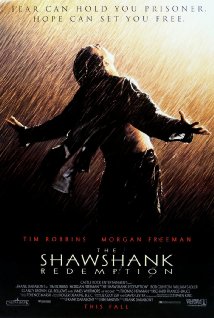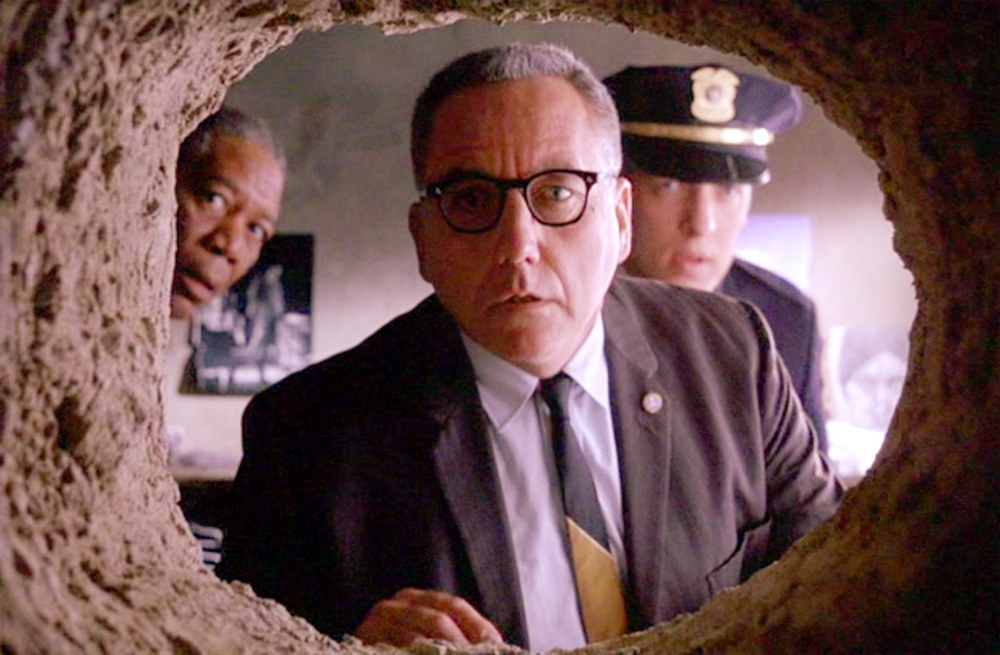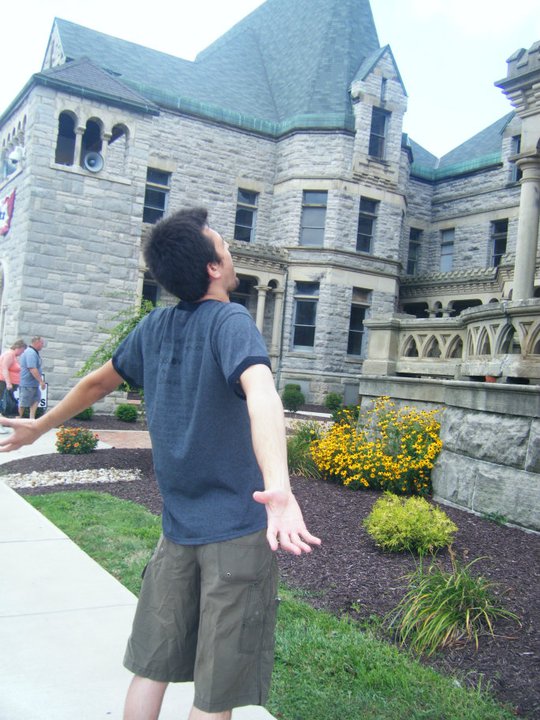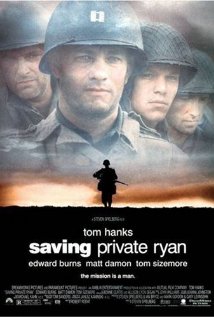This is post #29 in my series, 100 Movies … 100 Posts. In this ongoing series, I’m watching and writing about each film on the American Film Institute’s list of 100 greatest movies from #100 to #1. I’m not just writing a review of each movie. I am going to write a piece about whatever I find most pressing, as a critique of the film, an address of the issues it brings up, or my own experiences with the film. It will serve as an examination of the list itself and of political issues in Hollywood and the film industry.
Without further ado, #72 “The Shawshank Redemption”
——————————————-
“The Shawshank Redemption” is many things. It’s one of the most emotionally powerful films in the history of cinema. It’s arguably the greatest film adaptation of a Stephen King story (“The Shining” might be the closest competitor). It was nominated for Best Picture in 1995, along with fellow AFI 100 films “Pulp Fiction,” and the winner of the award, “Forrest Gump.” It’s No. 1 on IMDB’s top 250. It’s an excellent look at the problems that plague the U.S. justice and prison systems. Most importantly, it’s an education on how to pronounce “Dumas.”
The three big names involved with the film are a testament to its quality. Tim Robbins wasn’t a household name in 1994, though he’d previously starred in 1990’s “Jacob’s Ladder.” Since then, he’s got an Oscar to his name for his role in “Mystic River,” but “Shawshank” is certainly the first movie that comes to mind when Robbins’ name is mentioned. The role of Andy Dufresne was delicate and complex, but Robbins managed to nail it. The performance is obviously something special, as Robbins hasn’t been the most prolific of actors since 1994, but people still remember him. Morgan Freeman is one of the greatest actors in Hollywood’s history. In his most well-known films, he usually doesn’t star, and despite getting the costar label in this one, he does get his own arc at least, and it might be his greatest role. It’s always great to see him in movies, and it’s even a treat to hear when he gets work as a narrator, like in “March of the Penguins,” as he also has one of the smoothest voices you’ll ever hear. Lastly, there’s director Frank Darabont, who can also be attributed to the greatness of the first season of “The Walking Dead,” which went downhill after he left. The first episode is among the best episodes of dramatic TV you’ll ever see. He’s also responsible for two other great King adaptations, “The Green Mile,” and the underrated “The Mist.”
Robbins really does deserve special mention for bringing the character of Dufresne to life, as with his backstory, it could have gone horribly wrong if not handled to perfection. In the 1940s, Dufresne winds up at Shawshank Prison, a reformatory for the most notorious of offenders, for the murder of his wife and her extramarital lover. Since the film follows Dufresne, and expects the viewer to believe he is guilty of the murders, as due to the circumstances surrounding the crime, it appears highly likely that he was the one who committed them, it was up to Robbins to make the character someone the viewer is willing to follow and somewhat likable while also knowing that he’s guilty of a horrific act. So, it took a great actor to keep the film from falling apart. Freeman’s Red is somewhat similar, but even though he was admittedly guilty of the crime he’d been incarcerated for, it’s somewhat forgivable considering how long he’d already been in prison by the time Dufresne arrives. Obviously, the film is asking viewers to spend several hours only with people who’d committed horrible crimes (prison staff included), but that’s not something easily made into an enjoyable experience.
And the film certainly does plumb the depths of human depravity, though not from the criminals, as the viewer never witnesses the crimes they’ve committed, with the exception of Dufresne. Instead, the darkness of human nature is most exhibited in the prison warden and the guards. Clancy Brown as Captain Hadley is delightfully prickish, but also terrifying like when he beats a new convict to death because he freaked out about his first night in the slammer. Warden Norton (Bob Gunton) is great as a hypocritical white collar man who preaches obedience through the Bible while freely making backdoor deals selling the prisoners as a labor force while collecting all the profits. “Put your trust in the Lord; your ass belongs to me. Welcome to Shawshank,” he says to the fresh meat as they arrive.
Beyond the actions of the guards, the movie goes into just how bad U.S. prison conditions were in the ’40s. Prisoners are commonly threatened with rape from other prisoners, there are worms in the food, the guards take tremendous liberties with the prisoners, and overall, the goal of prison is to demoralize and dehumanize the criminals, not to rehabilitate them into functional citizens so they can be reintroduced to society, but to remove the rebelliousness, and therefore the humanity, so what’s left is an empty shell who can barely cope with life once released. Actually, that makes it sound like prison hasn’t changed much since the ’40s. Certainly, something needs to be done with violent people, as they can’t be allowed to be among the general population, but as seen in other countries with much lower rates of violent behavior, there must be a way to do it better than the U.S. is currently doing and has done for a very long time.
So, Dufresne, being an intelligent individual, a former accountant, learns quickly that the prison’s goal is to remove the humanity from its prisoners, and makes every effort to try to retain his own humanity, as well as that of his fellow prisoners. He befriends Red, as Red is a man who knows how to get things, to procure some simple items: a rock hammer and some stones so he can build a chess set … and Rita Hayworth (he procures a poster of her at least). Dufresne’s fight for humanity is a strong theme throughout the film, and the times when he has great successes are the peaks that counter the dark valleys of the film. When he procures beers for his fellow prisoners through a deal with the guards and when he locks himself in the warden’s office and plays Italian opera through the PA system for the entire prison to hear, it’s almost a divine experience. This theme can be relatable to everyone, as all people experience difficulties that threaten to steal their humanity, and there are life-sapping problems that are inherently part of every system (government, work, etc.) that people will encounter, not just prisoners. Darabont deserves major credit for masterfully orchestrating those highest points interwoven with the lowest ones.
The reality of dehumanization crystalizes when the old man, Brookes, whom James Whitmore portrays beautifully, is released from prison. He threatens to kill one of his friends so he can stay, because he’s become so accustomed, even comfortable with life in prison, and he’s so old that he knows he will have trouble functioning in a world that has changed and sped up so much since he was free that it’s completely foreign to him. He doesn’t have anyone he knows in the free world. He gets a job in a grocery store but can’t keep up the pace the boss wants. He has no hope of anything other than a fractured life, and he kills himself rather than waiting to die.
When Dufresne isn’t stirring up trouble, he’s finding ways to get in good with the guards and the warden. As a former accountant, he understands taxes, and when he offers to help the captain with his taxes, word spreads quickly. Within a few years, he’s doing taxes for all of the prison’s guards, the guards on the opposing recreational baseball teams, and the warden himself. This allows Dufresne to gain trust and get away with things none of the others would have been able to. Mostly, he uses this as leverage to improve the prison for the other cons, and help prevent his fellow inmates, as well as future residents from losing their souls.
The film as a whole is incredibly well-put together. Darabont managed to capture the essence of the ’40s even though the film takes place almost entirely in the prison. The pacing is perfect, as there’s something important happening in every scene. Everything is timed perfectly, so moments are allowed to linger but the movie still keeps moving, and there’s no waste. The audience’s emotions are manipulated magnificently with how information is withheld until the right moments to reveal the truth, and the viewer will often expect the film to go in one direction, but then will shift into the opposite direction. The film has a very rare dramatic perfection that is difficult to achieve for a lot of reasons, yet it still manages to keep a sense of humor, though it is very dark.
The one moment where it stumbles slightly in terms of narrative, and this is probably nitpicking, but when the prisoner arrives at Shawshank who knows the truth that Dufresne didn’t kill his wife and her other lover, because he just so happened to meet the guy who actually did, it seems like such a convenient coincidence that it’s a bit off-putting. But that prisoner’s fate saves it from being too tacky. And the movie does have such that spiritual, ethereal, serendipitous King quality that makes it not so bad. Then again, it’s never really made totally clear that the transferred prisoner is telling the truth, even though everyone around him seems to believe it.

You wouldn’t think some guys sitting around drinking beer would make for great cinema, but thanks to Darabont’s direction, it’s a heavenly moment.
There are also some aspects of the movie that are politically questionable. The black characters in other King adaptations actually fare worse (especially “The Green Mile”), but in this case, Red needs Dufresne to teach him how to not just be a prisoner but to hold out hope for release and to keep on living to maintain his humanity, whereas prior to their acquaintance and for most of the story until the end, Red appears to be content living the rest of his life in prison. Maybe he’s just resigned to the likelihood that he won’t ever get his release, but it shouldn’t take a white character to teach a black character that it’s okay to continue living. Even so, at least Red has his own character arc and narrates the story, and he’s still a good character, but there are some problems there.
While prison rape is still common today, the way it’s presented in the film likely promoted resentment towards gay men. It’s difficult because that’s an inherent part of prison life, and in an examination of the prison system, it’s important to address, and it’s something that needs to not happen. But a lot of heterosexual men fear gays. Many straight men view gays as predatory and think all of them want to rape the heteros and turn them gay or something, and with the popularity of this film, the portrayal of rape in prison undoubtedly must have contributed to that idea if not begun the perpetuation of it. There’s a part where Red warns Dufresne about some commonly known rapists, referred to derogatorily as the Sisters, which has ugly connotations. Dufresne asks if they’re homosexuals, to which Red replies that first they’d have to be human before they could be homosexuals. That’s a very problematic line for many reasons. The insinuation is that they’re dehumanized to the point that they feel no remorse about rape, and that’s probably an accurate assessment of prison rapists. But the viewer could just as easily connect their dehumanization to homosexuality. No doubt, this is how people in prison talk, and public attitudes toward LGB people have shifted drastically since 1994, but people probably didn’t walk away from this film with positive thoughts about gays.
When Dufresne finally hatches the plan he’d been working on the entire time, unbeknownst to the viewer, behind lovely Rita, away from the prying eyes of the guards and the warden. It unfolds like a masterfully planned heist. When Dufresne crawls through the wall, in and out of the shit pipe, and into the river in the rain, it’s one of the iconic images in film (so iconic, it’s on the poster). The warden gets what he deserved with an extra helping of shit from Dufresne, and Dufresne makes off with a new identity and the warden’s money. Everything comes together and every thread from throughout the movie is tied up to great satisfaction. After Red is released from prison, it’s incredibly difficult to keep the eyes dry when he finally meets Dufresne again, a rare moment where that sappy, sentimental ending is truly earned by the journey that preceded it.
“The Shawshank Redemption” is a masterclass in quality filmmaking. There really aren’t enough superlatives in the english language to describe it. There are many films that are great upon first viewing but start to unravel or lose their luster upon the fourth or fifth watch through. This is one of the few that’s a pleasure every single time. Get busy livin’ or get busy dyin’, and whether you’ve seen it 100 times or not at all, get busy watchin’ this movie.
Next up, #71. “Saving Private Ryan”




